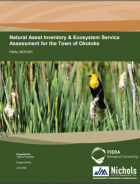Dr. Allan Carroll summarizes the outbreak of Mountain Pine Beetle (MPB) in British Columbia and what are the ongoing and future implications for forestry, the landscape and the economy of British Columbia. The Mountain Pine Beetle outbreak is almost done in B.C. 18 million ha were affected; by far the largest outbreak B.C. ever saw. About half of the mature pine in B.C. has been killed. 2017 probably sees the outbreak wrapped up. The discrepancies between 2003 and 2013 projections: smaller areas and volumes impacted but quicker, higher peak in volume killed; elevations changes slowed areal spread and "naïve trees" got hammered harder which resulted in faster kills but limited the population growth and spread of MPB. So MPB came and went more quickly than projected in 2003.
The ecological impacts are: a significant carbon source in the last 5 years, a native insect becomes invasive moving beyond its normal range. Socioeconomic impacts are emerging; timber supply the most significant. 10 -15 million cubic metres reduction in allowable cut is projected with an estimated $240-340 million annual loss to the provincial economy. So the extent and severity of the outbreak was not as severe as originally projected. Ecological impacts are still emerging and are site specific. Timber supply reductions and revenue loss will be significant for the B.C. economy.
Dr. Allan Carroll is Associate Professor and Director, Forest Sciences Program, Department of Forest & Conservation Sciences, University of British Columbia. His presentation was part of the Foothills Research Institute's Mountain Pine Beetle Research-Practitioner Information Exchange Forum, April 24-25, 2013 at the University of Alberta, Edmonton, Alberta.





